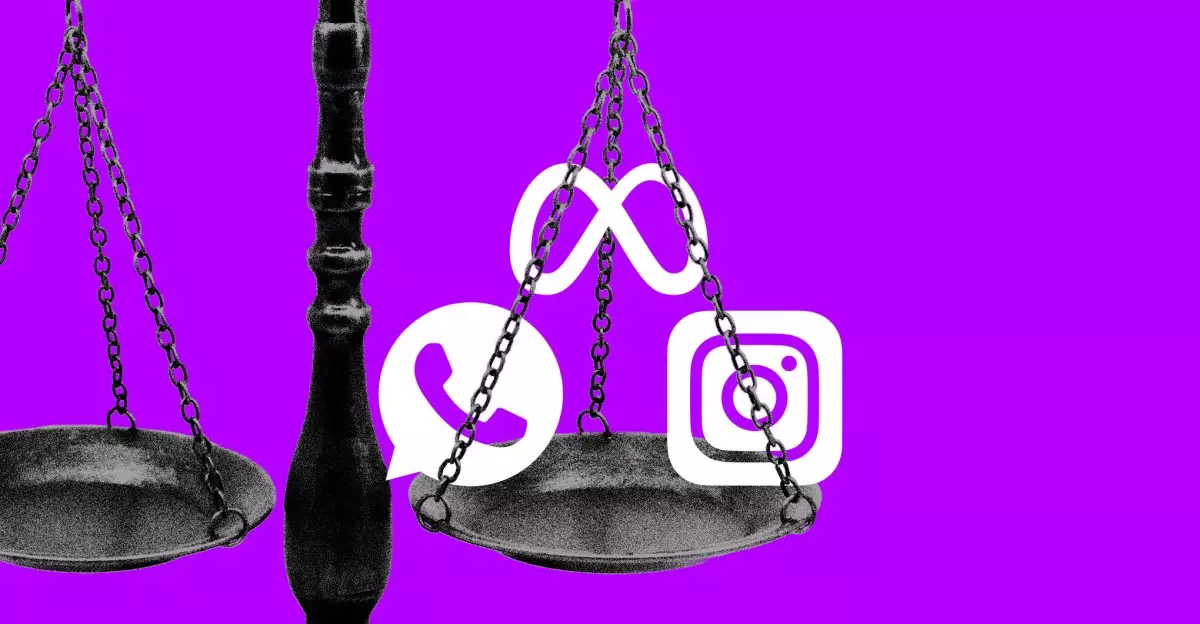The ongoing trial involving Meta and the Federal Trade Commission (FTC) represents a pivotal moment in the discourse surrounding antitrust issues in the tech industry. As CEO Mark Zuckerberg finds himself in the crosshairs of a lawsuit that accuses him of acquiring Instagram and WhatsApp with malign intent—to effectively eliminate competition—the case has escalated tensions between government regulatory bodies and one of the world’s most powerful technology conglomerates. This trial serves not only as a battlefield for legal arguments but also as a reflection of the unsettling dynamics between innovation, competition, and monopolistic tendencies that the current tech landscape embodies.
At the heart of the FTC’s accusations is the assertion that Zuckerberg’s purchase of WhatsApp for an eye-popping $19 billion in 2014 was motivated by the fear of it evolving into a rival social media platform. While filings allege a calculated strategy—in which notable platforms are absorbed to stifle competition—Zuckerberg’s defense sheds light on a differing narrative. His testimony, marked by a candidness rarely seen in corporate leaders, hinted at a genuine belief in the potential of these platforms, not just as means to dominate, but as invaluable assets in an industry characterized by rapid change.
Zuckerberg’s Defense: A Twist of Logic
Zuckerberg’s testimony, reportedly spanning approximately 13 hours over three days, positions him against an accusatory narrative that has gained traction. The CEO’s assertion that he found WhatsApp co-founders Jan Koum and Brian Acton to be adamantly disinterested in social media suggests a different motive behind the acquisition—rather than stifling competition, he claims an intention to expand and innovate. His reply to the question about his happiness regarding the WhatsApp investment—“I’d do it again”—carries a weight of conviction, suggesting he has no regrets, as he sees the app’s growth trajectory as fortunate hindsight.
Zuckerberg indicates that his strategic purchases were driven by the shifting paradigms of online communication. With conversations moving from public digital spaces like Facebook’s News Feed to more private platforms, he viewed WhatsApp as an essential asset to adapt to this evolving landscape. He positions himself as a forward-thinker, rather than a monopolistic gatekeeper stifling competition.
This claim, however, does not come without its complications. While he portrays WhatsApp’s acquisition as visionary, the FTC’s insistence that these actions are symptomatic of a larger monopolistic strategy casts a shadow over Zuckerberg’s narrative. The juxtaposition of Zuckerberg’s self-portrayal against the allegations of a predatory “catch-and-kill” approach presents a nuanced examination of intentions in the tech world.
The Numbers Game: Triumphs and Projections
One striking element of Zuckerberg’s defense lies in the impressive growth figures of both WhatsApp and Instagram post-acquisition. Underlining the financial success derived from WhatsApp’s nearly 3 billion users—a figure that surpassed internal projections significantly—Zuckerberg pointed to ad revenue flowing from these platforms as evidence that his acquisitions were not merely about eliminating competition but instead nurturing thriving enterprises.
Yet, therein lies another layer of complexity. By citing that Instagram has surpassed 2 billion users, Zuckerberg attempts to distill the conversation into one about success and financial prosperity. However, this success is clouded by how such dominance has potentially curtailed innovation across the sector. Critics argue that such acquisitions may lead to stagnation among competitors who are propelled into an unfathomable chasm by the sheer size of Meta’s portfolio.
Though Zuckerberg consistently deflected accusations by pointing to investment in improving platform functionality—such as combating spam on Instagram—the implications of creating an ecosystem where smaller players struggle to thrive remain pertinent. Observing the expansion of WhatsApp and Instagram through a lens of profit and growth might obscure a critical view of potential anti-competitive practices.
A Complicated Legacy of Innovation
As the trial continues, and as Zuckerberg faces scrutiny not just for business decisions but for a vision that some argue has fragmented the digital interaction landscape, the fallout may shape the future endeavors of tech giants. While Zuckerberg’s testimony frames Meta’s actions as forward-thinking, weaving in elements of entrepreneurship and adaptability, the FTC’s position remains a compelling counter-narrative aimed at preserving competitive landscapes.
Meta’s former COO, Sheryl Sandberg, echoed such nuances, regarding the Instagram acquisition as a gamble that has, in hindsight, yielded unexpected rewards, challenging the sentiment that the company overspent. Her admission hints at the unpredictable nature of innovations in the tech realm—substantial investments can indeed spur opportunities that lay far beyond anticipated futures.
The Meta trial, therefore, is not merely a judicial inquiry; it is also a microcosm of broader themes in technology—innovation, competition, and ethical business conduct. The outcome remains uncertain, but the implications are significant for regulatory practices and the trajectory of technological evolution. The intersection of ambition in tech innovation with the responsibilities to maintain a fair, competitive environment raises questions as to what we want the digital future to look like. The stakes are high, both for Meta and for the regulatory frameworks that may reshape the industry’s landscape moving forward.

